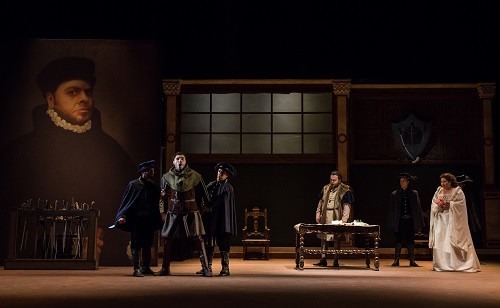 Argentina Verdi, Ernani: Soloists, Chorus and Orchestra of Buenos Aires Lírica, Conductor: Juan Casasbellas. Teatro Avenida, Buenos Aires. 5.8.2016. (JSJ)
Argentina Verdi, Ernani: Soloists, Chorus and Orchestra of Buenos Aires Lírica, Conductor: Juan Casasbellas. Teatro Avenida, Buenos Aires. 5.8.2016. (JSJ)

Buenos Aires Lírica’s Ernani. Photo credit: Liliana Morsia.
Cast:
Ernani: Nazareth Aufe
Elvira: Monserrat Maldonado
Don Carlo: Lisandro Guinis
Don Ruy Gómez de Silva: Sávio Sperandio
Production:
Director: Crystal Manich
Sets: Noelia González Svoboda
Costumes: Emilia Tambutti
Lighting: Rubén Conde
Chorus: Juan Casasbellas
Buenos Aires Lírica is very much at the forefront in bringing lesser performed works to the local stage and this year has excelled itself. So far we have seen Faust and I Capuleti e i Montecchi – and now Verdi’s Ernani (and more to come later in the year).
Ernani follows Nabucco and I Lombardi In terms of Verdi’s oeuvre, towards the end of what is considered his ‘early period’. Initially it was successful but by the start of the 20th century its popularity was waning and to this day it remains infrequently performed. Indeed, in Buenos Aires the last production was also by BA Lírica, in its 2006 season, while the one and only production at the Teatro Colón was in 1964.
Ernani is based on the play of the same name by Victor Hugo, and has Elvira loved by three men – her elderly uncle Don Silva to whom she is betrothed, the king Carlo of Spain and the bandit/nobleman in disguise Ernani, who is the one she loves. While Carlo, having taken Elvira as a hostage, commits to turning his back on his youth and living a changed life with his coronation, chivalry and honour result in Ernani being housed as a guest by Don Silva but finally at the latter’s call and taunting, taking his own life.
This was a new production, well conceived and executed. Both scenery and dress gave a sense of period – strictly 1519 – and thoughtful splitting of the stage enabled rapid changes of scene. The subtle use of the lighting, and especially the occasional highlighting of the character of the moment, added a notable touch without being overdone or detracting from the flow.
With four main characters, all four need to be strong and this was the one area in which this production was marred, with the ‘visitors’ outshining the ‘locals’. Nazareth Aufe as Ernani sung well but lacked volume while Lisandro Guinis as Carlo was uneven and lacking in bearing. Brazilian bass Sávio Sperandio as Silva dominated both vocally and visually. Paraguayan soprano Monserrat Maldonado as Elvira was dramatic and – described in the programme biography as “one of the best lyrical voices of the new generation” from her country – is a voice to watch.
Juan Casasbellas, in addition to training the chorus, was this time on the podium and brought insight and depth to the score, which has everything Verdi is known for – arias, duets, trios and choruses – but which arguably reached a greater degree of depth in his later works.
Jonathan Spencer Jones
